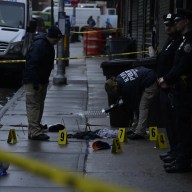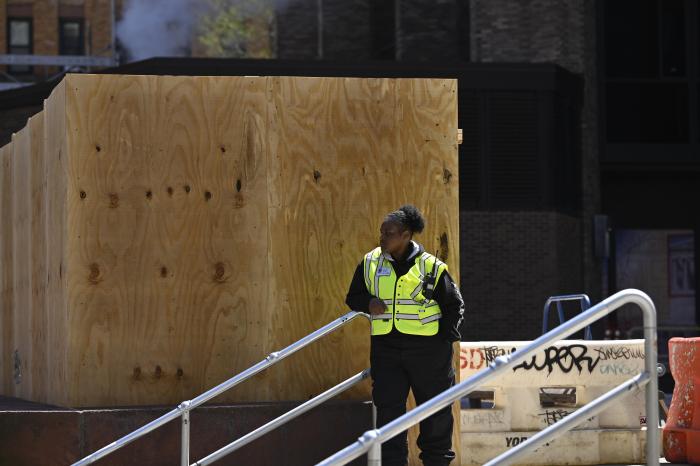By Ayala Ben-Yehuda
Members of Queens’ gay community reacted with joy last week after the U.S. Supreme Court struck down a Texas law banning homosexual sex, with activists calling the move a watershed moment in the fight for gay rights.
Reactions outside the gay community were mixed, with Bishop Thomas V. Daily of the Diocese of Brooklyn expressing disappointment in the ruling and a Jewish civil rights group supporting it.
The court voted 6-3 last Thursday to overrule the Texas statute against sodomy, which outlawed sex between two people of the same gender, because it did not apply equally to heterosexuals and because it unfairly criminalized private sexual activity.
“It’s like celebration and jubilation all over the nation,” said Brendan Fay, an activist from Astoria who organizes Woodside’s gay-friendly St. Patrick’s Day parade.
In a statement issued by the diocese, which also governs Catholic churches in Queens, Daily said “the Supreme Court’s decision in Lawrence v. Texas reduces respect for a teaching that many faith traditions share — that sexual activity belongs to the marital relationship between one man and one woman who are faithful to one another.
“I deeply regret the decision reached by the court,” said Daily.
The Anti-Defamation League of the B’nai Brith, a civil rights group originally founded to fight anti-Semitism, hailed the Supreme Court decision.
“We are all safer today because the court reaffirmed the principle that bigotry and fear may not be the basis for criminalizing private consensual conduct,” said a statement from the ADL, which participated in a friend of the court brief filed on behalf of civil rights groups in the case.
The Rev. N.J. L’Heureux, Jr., executive director of the Queens Federation of Churches, said the religious community was “divided on the underlying issue of whether homosexuality should be regarded as acceptable behavior.”
Though his group, which represents 370 Protestant, Catholic and Orthodox congregations, did not have an official position on the ruling, L’Heureux said some of his members believed that morals could not always be enforced with laws.
“For the court not to have affirmed the right to privacy in this case would open up serious civil liberty concerns with respect to the right to privacy and in many other situations,” said L’Heureux, a member of the United Methodist denomination.
New York state’s anti-sodomy law was repealed in June 2000 as part of a larger effort to modernize its sexual assault laws, according to the Empire State Pride Agenda, a gay rights group. The Supreme Court’s decision effectively nullifies the sodomy laws in 13 mostly Southern states.
The case that prompted the Supreme Court ruling involved two men from Texas who were arrested after police, responding to a false report of a weapons disturbance at one of their apartments, found the pair engaging in sex.
Writing for the majority, Justice Anthony Kennedy wrote: “The case does involve two adults who, with full and mutual consent from each other, engaged in sexual practices common to a homosexual lifestyle…The state cannot demean their existence or control their destiny by making their private sexual conduct a crime.”
Pauline Park, secretary of the Queens Pride House, said the ruling “signals a coming of age for the lesbian, gay, bisexual and transgender community.”
“Some people are referring to it as the gay Brown vs. Board of Education,” said Park, referring to the landmark case outlawing racial segregation.
Park said the ruling’s effect in New York state would be indirect but significant, potentially paving the way for same-sex marriages by helping to challenge the federal Defense of Marriage Act, which outlaws same-sex marriage.
“What (Justice) Kennedy’s ruling said is that there is a due process right for lesbian and gay people under the Constitution,” said Park.
The activist also hoped the ruling would help change social mores.
“A ruling from the Supreme Court will send a very strong signal that lesbian, gay, bisexual and transgendered people are deserving of full respect,” said Park.
Fay said the Supreme Court ruling, combined with Canada’s recent extension of civil marriage to same-sex couples, represented a major milestone for gays.
Fay, who married his partner Tom Moulton in a commitment ceremony May 24, is planning to have a government-sanctioned wedding in Canada July 12. He and Astoria activist Jesus Lebron are organizing a group trip to that country for other same-sex couples who want to marry.
Of the Supreme Court decision, Fay said “it’s very moving, it’s beautiful,” but acknowledged that gays’ fight for equality still has a long way to go.
“In most places you can still be fired because you’re gay, and gay people still are without protections in most places,” said Fay, citing discrimination in immigration, employment and tenancy laws.
“It’s going to take a lot of commitment from community, legislators and politicians who need to take a stand on equality,” he said.
U.S. Senate Majority Leader Bill Frist (R-Tenn.) floated a Constitutional amendment last week that would prohibit same-sex marriages.
Reach reporter Ayala Ben-Yehuda by e-mail at Timesledger@aol.com or call 718-229-0300, Ext. 146.































